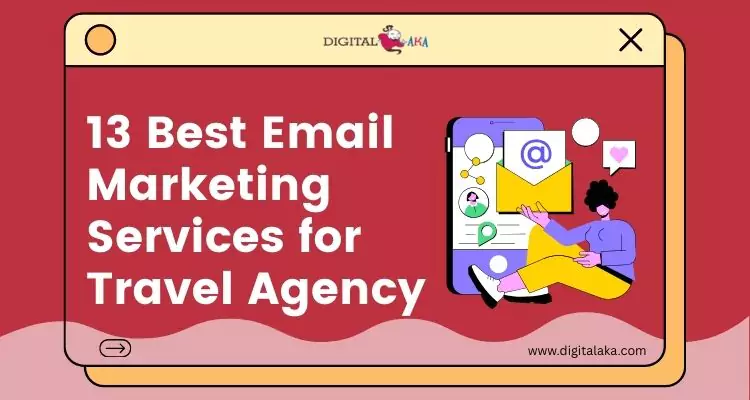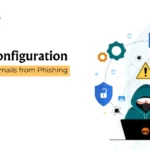
DKIM Configuration- Protect Your Emails from Phishing
January 29, 2025
Email Bounce Rate- How to Track and Reduce It
February 6, 2025Email Compliance Laws are rules businesses must follow when sending emails to customers. These laws help protect people from unwanted emails, spam, and privacy violations. If companies do not follow these rules, they can face big fines, legal trouble, and damage to their reputation. Understanding these laws is very important to keep your email marketing safe and legal.

In this guide, we explain the key Email Compliance Laws, important email rules, and best practices for sending emails correctly.
Table of Contents
What Are Email Compliance Laws?
Email Compliance Laws are rules businesses must follow when sending emails to people. These laws help prevent spam, protect privacy, and ensure that people receive only the emails they want. Some important email laws include the CAN-SPAM Act (in the U.S.), GDPR (in Europe), and CASL (in Canada).
These laws require businesses to get permission before sending marketing emails, provide an easy way for people to unsubscribe, and include correct sender information. If businesses break these rules, they can face big fines and legal problems.
Pricing
| Trail Plan | Standard Plan | Premium Plan | Professional Plan |
| $50 | $145 | $185 | $225 |
| Sending Limit | Sending Limit | Sending Limit | Sending Limit |
| 1000 Emails/Hour | 1500 Emails/Hour | 3000 Emails/Hour | 5000 Emails/Hour |
Why Are Email Compliance Laws Important?
Email Compliance Laws are very important for businesses that send emails to customers. These laws help protect people from spam and unwanted messages. If businesses do not follow these laws, they can face big problems. Here are some key reasons why Email Compliance Laws matter:
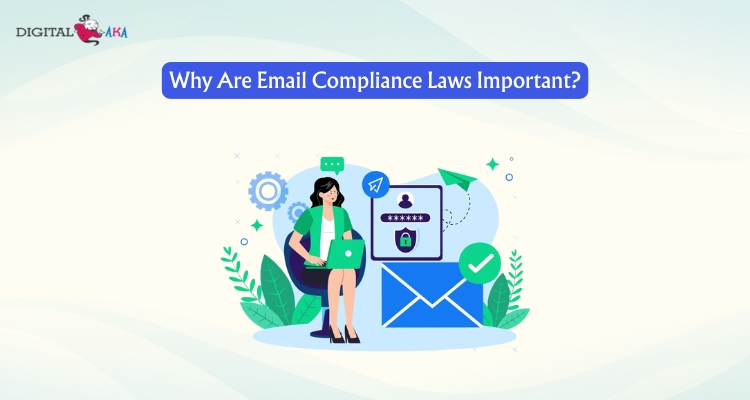
- Avoid Legal Trouble – If businesses break email compliance regulations, they may have to pay large fines or face legal action. Following the rules keeps businesses safe.
- Protect Customer Privacy – Email compliance rules ensure that businesses respect people’s privacy. They must get permission before sending marketing emails.
- Build Trust with Customers – When businesses follow Email Compliance Best Practices, customers feel safe and are more likely to engage with emails.
- Improve Email Deliverability – If businesses do not follow email compliance rules, their emails may go to spam folders instead of inboxes.
- Maintain Brand Reputation – Sending emails the right way helps businesses stay professional and trustworthy. If they ignore email compliance regulations, customers may stop trusting them.
- Avoid Being Marked as Spam – If too many people report emails as spam, businesses may not be able to send emails in the future. Following Email Compliance Best Practices helps avoid this problem.
Key Email Compliance Laws You Should Know
Below are the most important Email Compliance Laws that you should know:
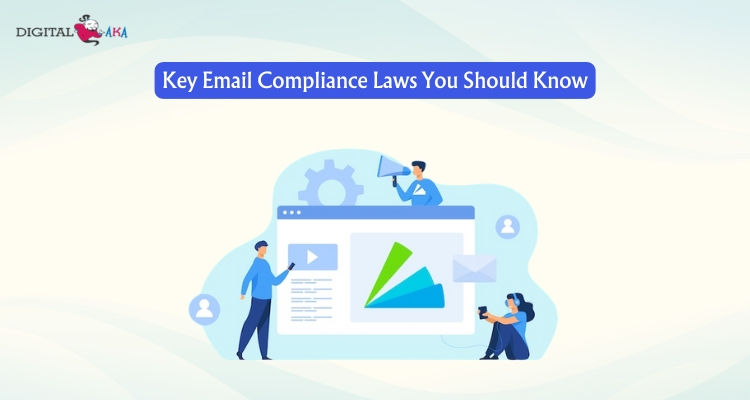
1. CAN-SPAM Act (USA)
The CAN-SPAM Act is a law in the United States that controls how businesses send marketing emails. It ensures that emails are not misleading and gives recipients the option to unsubscribe.
Key rules:
- Do not use false or misleading subject lines.
- Include a valid business address in every email.
- Provide a clear way for people to unsubscribe.
- Honor unsubscribe requests within 10 days.
2. GDPR (General Data Protection Regulation – Europe)
GDPR is one of the strictest email compliance regulations in the world. It protects the personal data of people in the European Union. Businesses must get permission before sending emails.
Key rules:
- Get clear consent from people before sending marketing emails.
- Allow users to access, change, or delete their data.
- Be transparent about how you collect and use personal data.
3. CASL (Canada’s Anti-Spam Law)
CASL is a strict law that applies to businesses sending emails to people in Canada. It requires businesses to have consent before sending promotional emails.
Key rules:
- Get explicit or implied consent from recipients.
- Include business contact details in every email.
- Provide an easy way to unsubscribe.
- Keep records of consent for future reference.
4. PECR (Privacy and Electronic Communications Regulations – UK)
PECR works alongside GDPR and controls electronic marketing in the UK. It applies to email services, text messages, and phone marketing.
Key rules:
- Get permission before sending marketing emails.
- Do not send spam or automated marketing messages without consent.
- Allow users to opt-out easily.
5. CCPA (California Consumer Privacy Act)
CCPA gives people in California control over their personal information. It applies to businesses that collect customer data.
Key rules:
- Inform users what data you collect and how you use it.
- Allow users to opt out of data collection.
- Respond to user requests about their data.
Email Compliance Best Practices for Legal and Ethical Email Marketing
Below are some of the most important Email Compliance Best Practices to keep in mind.
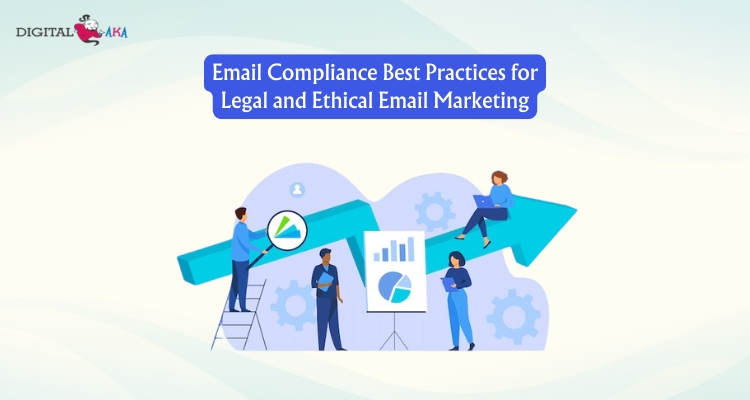
1. Get Consent Before Sending Emails
One of the most important aspects of Email Compliance Laws is obtaining explicit consent from the people you are emailing. This is a requirement in many countries and is crucial to ensuring that you are not sending unsolicited emails, also known as spam.
- Ask for permission: Always get permission before sending emails to anyone. This could be through an opt-in form on your website, a checkbox during registration, or a sign-up for a newsletter.
- Clear and transparent: Make sure the person knows what they are signing up for. If you’re collecting their email address, let them know they will be receiving marketing emails.
Email compliance regulations are very clear about this. Sending emails without consent can lead to fines and a damaged reputation.
2. Provide an Easy Way to Unsubscribe
Another key part of email compliance rules is allowing recipients to easily opt out or unsubscribe from your emails whenever they choose. This is not only a legal requirement but also a best practice to maintain a healthy relationship with your subscribers.
- Visible unsubscribe option: Make sure every email you send has a clear and easy-to-find unsubscribe link.
- Respect requests: When someone unsubscribes, remove them from your mailing list immediately. Continuing to send emails after an unsubscribe request can result in penalties under Email Compliance Laws.
3. Include Accurate Sender Information
Your emails should always provide truthful and clear information about who is sending the email. Email compliance regulations require businesses to clearly identify themselves to avoid misleading recipients.
- Use a recognizable sender name: Use your business name or a trusted representative’s name in the “From” field.
- Correct subject line: Avoid misleading or deceptive subject lines that could trick people into opening your email.
Transparency helps build trust with your audience and ensures that your emails are compliant with email compliance rules.
4. Avoid Misleading Content and Subject Lines
One of the most common violations of Email Compliance Laws is sending deceptive or misleading emails. This includes using false subject lines or content that misrepresents the email’s purpose.
- Be honest: Your subject line should match the content of your email. If the email is about a sale, make sure the subject reflects that accurately.
- Don’t use deceptive tactics: Avoid using “clickbait” tactics or misleading offers that could harm your credibility.
Following these email compliance regulations not only keeps you in legal compliance but also ensures that your customers trust you.
5. Respect Privacy and Protect Data
With the rise of data privacy concerns, it is more important than ever to protect the personal information of your email recipients. Many Email Compliance Laws require businesses to follow strict guidelines to safeguard customer data.
- Collect only necessary data: Only ask for information that is required for the email campaign.
- Secure the data: Make sure that the personal data you collect is stored safely and protected from unauthorized access.
- Privacy policies: Communicate your privacy policies to subscribers, explaining how you use and store their data.
By following these Email Compliance Best Practices, you ensure that your email marketing respects your recipients’ privacy and stays in line with global data protection regulations.
6. Maintain a Clean and Updated Email List
A good practice in email marketing is regularly cleaning your email list to ensure you are only sending emails to people who have consented to receive them. Keeping an up-to-date list helps ensure you comply with email compliance rules and prevents you from accidentally sending messages to people who don’t want to hear from you.
- Remove inactive subscribers: Regularly check for users who haven’t opened or clicked your emails in a long time. If they don’t engage, it’s better to remove them.
- Avoid purchased lists: Never buy email lists. Not only is this unethical, but it also likely violates email compliance regulations in many regions.
An updated list helps you reach the right audience, improve your email marketing performance, and stay compliant with the law.
7. Understand the Legal Requirements in Your Region
Email Compliance Laws can vary depending on where you are located or where your recipients are based. It’s essential to be aware of and follow the legal requirements for email marketing in different countries. For example, the General Data Protection Regulation (GDPR) in the European Union has specific rules on data privacy and consent.
- Know the regulations: Familiarize yourself with the email laws in the countries where you send emails. For instance, the CAN-SPAM Act in the U.S. and GDPR in Europe have different requirements for consent and data protection.
- Local adjustments: Customize your email marketing strategy to fit the rules and expectations of different regions.
8. Use Reliable Email Service Providers
Using a trustworthy and reliable email service provider (ESP) can help ensure your email campaigns comply with email compliance regulations. Many ESPs have built-in features to help you follow Email Compliance Laws effectively.
- Built-in compliance features: Choose an ESP that includes tools for collecting consent, managing subscriptions, and adding unsubscribe links to your emails automatically.
- Reporting and analytics: An ESP can also provide analytics on your campaigns to track engagement and ensure you’re following best practices.
Consequences of Violating Email Compliance Laws
Here are some of the main consequences of not complying with these laws:
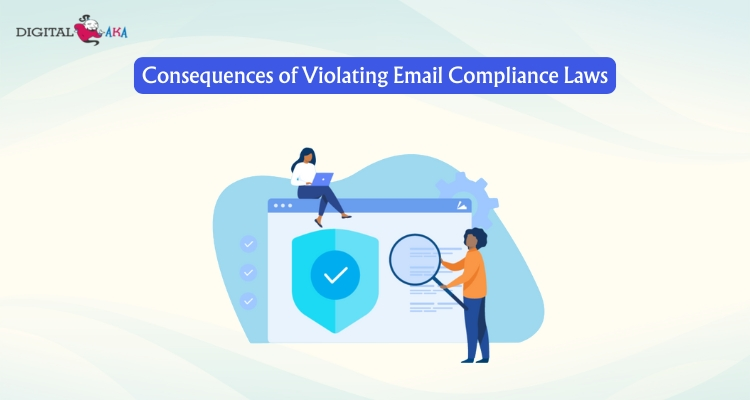
- Fines and Penalties: If businesses do not follow email compliance rules, they can face large fines. In some cases, these fines can reach thousands of dollars for each violation.
- Legal Actions: Failure to comply with email compliance regulations can lead to lawsuits. People who receive spam emails or feel their privacy has been violated can take legal action against a business.
- Damage to Reputation: When businesses ignore email compliance laws, they risk losing the trust of their customers. People may stop opening their emails or even unsubscribe from email lists. This can hurt the company’s reputation and sales.
- Blacklisting: Non-compliant businesses may get added to email blacklists. This means that email providers, like Gmail or Yahoo, might block your emails, preventing them from reaching customers.
- Loss of Customer Trust: If people feel their privacy is not respected, they may avoid doing business with you. Following Email Compliance best practices helps show customers that you care about their privacy and safety.
Conclusion
Understanding and adhering to Email Compliance Laws is critical for any business that engages in email marketing. By following email compliance regulations and email compliance rules, companies can ensure legal compliance, build trust with recipients, and optimize their email campaigns for better performance. Implementing Email Compliance Best Practices will not only keep you compliant but also improve engagement and customer satisfaction.
By prioritizing compliance, you can safeguard your business from legal risks and maximize the effectiveness of your email marketing efforts.


